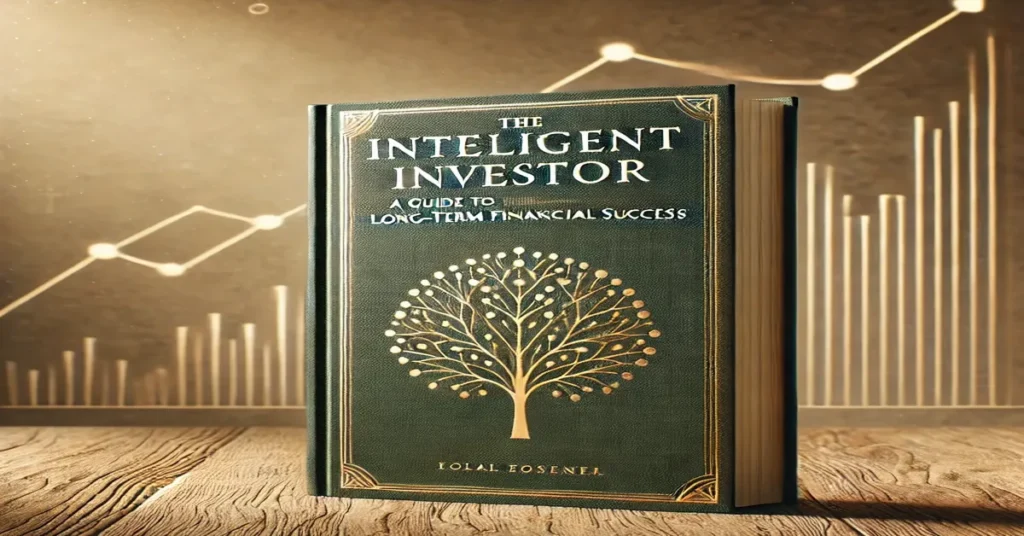The journey to financial security and independence is one that requires patience, discipline, and sound decision-making. For investors looking to build wealth over the long term, Benjamin Graham’s principles in The Intelligent Investor serve as a timeless guide. Written in 1949 and continually revised, Graham’s book provides the foundation for value investing—a strategy that focuses on buying undervalued securities based on intrinsic value rather than speculating on price trends.
The Intelligent Investor offers timeless insights that not only help investors safeguard their wealth during economic downturns but also foster a prudent approach to portfolio growth. The book advocates for a cautious, methodical approach to investing, designed to shield investors from their own biases, irrational behavior, and market volatility. This article distills key principles from The Intelligent Investor, explores practical ways to implement these principles, and explains why they remain essential for today’s investors.
Core Principles of The Intelligent Investor
1. Understanding Investment vs. Speculation
One of the most critical distinctions Graham makes is between investing and speculating. An investment operation, as Graham defines it, is one that “upon thorough analysis promises safety of principal and a satisfactory return.” In contrast, speculation is an attempt to profit from short-term market fluctuations, often with little consideration of the asset’s underlying value.
In today’s market, the line between investing and speculating is increasingly blurred, with technology enabling rapid trading and social media amplifying hype-driven investment decisions. Yet, to be a successful investor, it’s essential to adopt a mindset rooted in long-term wealth creation. This requires focusing on the value and prospects of an investment rather than short-term price movements.
2. The Importance of a Margin of Safety
The “margin of safety” principle is perhaps the most celebrated concept in The Intelligent Investor. Graham advises that investors should buy stocks only when they are significantly undervalued, creating a cushion that protects against unforeseen risks. This concept reflects the idea that no matter how carefully an investor studies a company, there are always unknown factors at play.
For instance, if a stock’s intrinsic value is $100 per share, a prudent investor would only consider buying it at a significant discount—say, $70 or less. This discount acts as a safety net, mitigating losses if unforeseen events cause the stock’s value to drop. The margin of safety is essential because it helps investors manage risk by creating a buffer that accounts for errors in judgment, economic downturns, or sudden market volatility.
3. Mr. Market and Emotional Discipline
Graham introduces the concept of “Mr. Market” to personify the stock market’s emotional swings. Mr. Market is a fickle character who offers to buy or sell shares daily at varying prices, sometimes irrationally high and sometimes absurdly low. The intelligent investor sees Mr. Market’s mood swings as opportunities rather than cues to follow.
When Mr. Market offers a high price, it may be a good time to sell; when he offers a low price, it may be a good time to buy. The lesson here is clear: investors should avoid reacting emotionally to market fluctuations and instead focus on the intrinsic value of their investments. Emotional discipline is key to avoiding the pitfalls of market timing and speculative behaviors.
4. Value vs. Growth Investing
In The Intelligent Investor, Graham distinguishes between value and growth investing. Value investing involves seeking out stocks that are undervalued relative to their intrinsic worth, while growth investing focuses on companies expected to experience significant earnings growth.
While both approaches have their merits, Graham advocates value investing for conservative investors, as it aligns with his principle of safety and reliability. Value stocks are often less volatile and offer better protection during market downturns. Although growth stocks can offer impressive returns during bull markets, they are also more susceptible to price fluctuations and are generally riskier investments.
5. The Role of Defensive vs. Enterprising Investors
Graham categorizes investors into two types: defensive and enterprising. Defensive investors prioritize capital preservation and a passive investment approach, favoring stable, high-quality stocks and bonds. They tend to invest in well-established, dividend-paying companies that offer long-term stability.
Enterprising investors, on the other hand, are willing to dedicate time and effort to research undervalued opportunities in the market. These investors are not risk-seekers but are comfortable managing a more active portfolio. Enterprising investors seek a higher return than the defensive investor by identifying and investing in undervalued or overlooked stocks.
6. Diversification as a Risk Management Tool
Diversification is another essential concept in Graham’s philosophy. By spreading investments across different asset classes, sectors, and companies, investors can reduce the impact of a poor-performing asset on their overall portfolio. Diversification is not about maximizing returns but rather minimizing risk and protecting against the unpredictable nature of individual securities.
Graham advocates for a balanced portfolio of stocks and bonds, with the allocation adjusted based on market conditions and the investor’s financial goals. During uncertain times, increasing the bond portion can provide stability; during economic growth, a higher stock allocation can enhance returns. A diversified portfolio ensures that no single investment can severely damage the investor’s financial health.
Applying the Principles of The Intelligent Investor in Today’s Market
1. Setting Realistic Expectations
The modern investor must acknowledge that the market offers no guarantees, and success is seldom immediate. Many investors enter the market with inflated expectations fueled by stories of overnight millionaires. However, the principles in The Intelligent Investor remind us that steady, realistic goals aligned with long-term planning are far more reliable than expecting to “beat the market” consistently.
To set realistic expectations, consider the historical average return of the stock market (around 7-10% annually) as a benchmark. While some years may bring higher returns, others may bring losses. Over time, however, a diversified portfolio with a disciplined approach generally outperforms speculative strategies.
2. Staying Informed and Performing Due Diligence
Graham’s philosophy underscores the importance of performing due diligence before making any investment decision. This means not only studying a company’s financials but also considering industry trends, economic conditions, and competitive positioning.
In today’s information-rich environment, investors have access to numerous resources—annual reports, analyst ratings, and financial news. While these tools aid in decision-making, it’s vital to avoid information overload. An intelligent investor knows when they have gathered enough information to make an informed choice and avoids paralysis by analysis.
3. Maintaining Discipline During Market Volatility
Market volatility often leads to panic-selling and irrational decisions. However, Graham’s principles suggest that downturns are a natural part of investing and often present buying opportunities for the patient investor. During market declines, investors should revisit their portfolio and consider rebalancing if necessary but avoid making drastic changes based on temporary market conditions.
For instance, the COVID-19 pandemic led to significant volatility, but those who maintained a long-term perspective and adhered to Graham’s principles found opportunities amid the downturn. By focusing on intrinsic value and not market noise, investors can weather short-term turbulence and remain on course.
4. The Role of Low-Cost Index Funds
While Graham primarily discusses individual stock selection, his philosophy supports the modern concept of low-cost index funds, especially for defensive investors. Index funds offer a diversified, low-fee investment option that has consistently outperformed many actively managed funds over the long term. These funds align with the principles of diversification, discipline, and long-term growth advocated by Graham.
By investing in an index fund, an investor gains exposure to a broad segment of the market, thereby reducing company-specific risk. This strategy allows investors to benefit from the stock market’s overall growth without the need to pick individual stocks or engage in speculative trading.
Common Misconceptions About The Intelligent Investor
1. Value Investing Doesn’t Mean Buying Cheap Stocks
A common misconception is that value investing means purchasing the cheapest stocks available. However, value investing, as Graham describes it, is about identifying companies that are undervalued relative to their intrinsic worth, not simply buying low-priced stocks. An intelligent investor looks for quality companies with a strong financial position, consistent earnings, and a proven track record.
2. Growth Stocks Can Still Have Intrinsic Value
While Graham leans towards value investing, he doesn’t discourage growth investing outright. Growth stocks can still be part of an intelligent investor’s portfolio if purchased at a reasonable price relative to their intrinsic value. The key is to avoid overpaying for anticipated growth, as even high-quality growth stocks can become speculative if their prices exceed their intrinsic worth.
3. You Don’t Need to Be an Expert to Be an Intelligent Investor
Another misconception is that only financial experts can succeed as intelligent investors. Graham’s principles are designed to empower ordinary investors to make informed decisions without needing specialized knowledge. By understanding the fundamentals, maintaining discipline, and focusing on intrinsic value, any investor can adopt the intelligent approach Graham advocates.
Conclusion
The Intelligent Investor remains a crucial resource for anyone seeking to build and protect wealth through disciplined, informed investing. By focusing on fundamental principles like intrinsic value, margin of safety, diversification, and emotional discipline, Graham provides a roadmap for long-term financial success. His insights are as relevant today as they were over 70 years ago, offering a path through the complexities and uncertainties of modern markets.
For investors willing to embrace patience, perform due diligence, and adhere to sound principles, The Intelligent Investor is more than just a book; it’s a philosophy that can lead to financial independence. While the financial world will continue to evolve, Graham’s time-tested approach remains a beacon of rationality, safeguarding investors from market excesses and their own tendencies toward emotional decision-making.
Frequently Asked Questions (FAQs)
1. What is the main difference between investing and speculating?
- Investing is the process of buying assets based on their intrinsic value and holding them for long-term growth, while speculating involves attempting to profit from short-term market price fluctuations.
2. What does “margin of safety” mean, and why is it important?
- The margin of safety is the discount at which an investor buys a stock below its intrinsic value. It provides a buffer against errors in valuation and unexpected market downturns, reducing the potential for loss.
3. How does The Intelligent Investor suggest handling market volatility?
- Graham advises investors to view market volatility as an opportunity rather than a threat. By remaining disciplined and focusing on intrinsic value, investors can use downturns to purchase quality assets at a discount.
4. Is value investing still relevant in today’s market?
- Yes, value investing remains relevant as it focuses on purchasing undervalued assets, which aligns with the principles of risk management and long-term wealth creation in a volatile market.
5. Can I apply Graham’s principles if I only invest in index funds?
- Absolutely. Index funds align with Graham’s emphasis on diversification, and they provide exposure to the market’s long-term growth potential with lower fees and reduced company-specific risk.
6. Do I need to be a financial expert to follow Graham’s principles?
- No, Graham’s principles are designed for ordinary investors. By focusing on fundamental concepts like intrinsic value, discipline, and patience, any investor can benefit from the intelligent approach Graham advocates.







